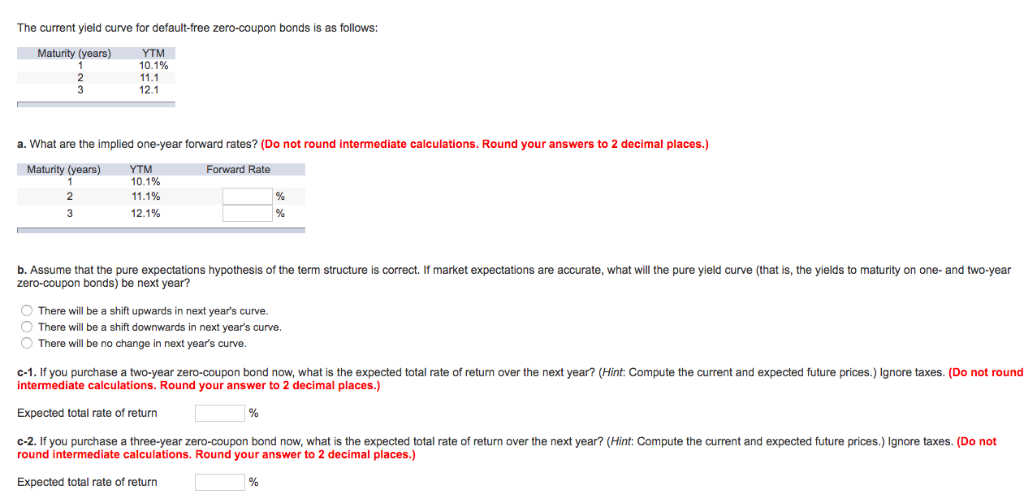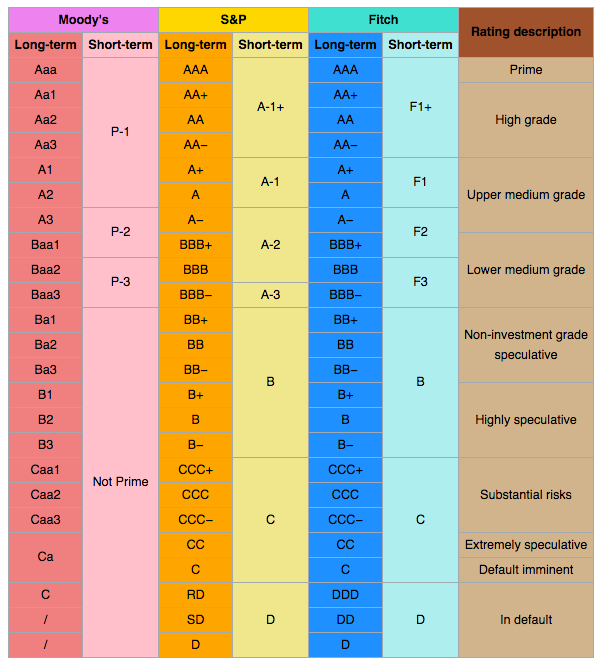44 coupon vs zero coupon bonds
The lower the coupon the longer the duration The zero coupon bond is ... This preview shows page 146 - 149 out of 162 pages. The lower the coupon, the longer the duration. The zero-coupon bond is the ultimate low coupon bond, and thus would have the longest duration. 35. When interest rates decline, the duration of a 10-year bond selling at a premium A. increases. B. decreases. Zero Vs Fixed Coupon Bond volatility | QuantNet Community Everywhere I look for this on the internet I read that Zero Coupon Bonds are more volatile than Fixed Coupon Bonds. The explanation for this seems to be that the Duration (both Macaulay and Modified) are larger the lower the size of the coupon is, and consequently a, let's say 10Y ZC Bond has a larger duration than a 10Y 5% Coupon Bond.
All the 21 Types of Bonds | General Features and Valuation | eFM Jun 13, 2022 · In the US, Government dealer firms usually break down a coupon-bearing bond into a series of zero-coupon bonds by considering each cash flow as a separate bond. For example, a 5-year semiannual coupon-bearing bond can be split into 10 zero-coupon bonds with coupon amount as face value and 1 zero-coupon bond with the principal amount as the face ...

Coupon vs zero coupon bonds
Coupon Bond - Guide, Examples, How Coupon Bonds Work A coupon bond is a type of bond that includes attached coupons and pays periodic (typically annual or semi-annual) interest payments during its lifetime and its par value at maturity. These bonds come with a coupon rate, which refers to the bond's yield at the date of issuance. Bonds that have higher coupon rates offer investors higher yields ... Deep Discount Bonds Vs Zero Coupon Bonds : AsambleDiscount Get Deep Discount Bonds Vs Zero Coupon Bonds from this website and save money on your next purchase. They update the coupons regularly, so be sure to check back often for the latest deals.You may visit the link to get started and find the perfect coupon for you. Zero-Coupon Bonds: Pros and Cons - Management Study Guide Zero-coupon bonds are those bonds that are sold at a deep discount to their face value. This means that these bonds do not receive any periodic interest.
Coupon vs zero coupon bonds. New Investor's Guide to Premium and Discount Bonds Oct 31, 2021 · There is more going on with bonds than this simple scenario. Bonds can become premium or discount bonds. They could trade above or below their par value while bond traders attempt to make money trading these yet-to-mature bonds. A premium bond trades above its issue price. This is called its par value. A discount bond does the opposite. 14.3 Accounting for Zero-Coupon Bonds - Financial Accounting This zero-coupon bond was sold for $2,200 below face value to provide interest to the buyer. Payment will be made in two years. The straight-line method simply recognizes interest of $1,100 per year ($2,200/2 years). Figure 14.11 December 31, Years One and Two—Interest on Zero-Coupon Bond at 6 Percent Rate—Straight-Line Method I Bonds vs TIPS - Bogleheads Oct 27, 2016 · I Bonds vs TIPS compares the similarities and differences between I savings bonds and Treasury Inflation Protected Securities (TIPS). Both instruments offer inflation protection. The Treasury Department has an excellent comparison table, shown below, but their language isn't the easiest to understand. We will elaborate and explain this ... Zero-Coupon Bond vs Regular Bond 11340 - YouTube Zero-Coupon Bond vs Regular BondResource Multiple Languages: : ...
Zero-coupon bond - Bogleheads Zero-coupon bonds or "zeros" result from the separation of coupons from the body of a security. Consequently, from a single coupon-paying bond, two bonds result: one which pays the coupons but returns no principal at maturity (an annuity), and one which pays no coupons but returns the par value at maturity (a zero-coupon bond). Zeroes sell ... Zero-Coupon Bonds : What is Zero Coupon Bond? - Groww Zero-Coupon Bond. In earlier days, companies used to raise funds from investors based on a written guarantee. This written guarantee is known as a bond. Coupon bonds provide coupons or interests at regular intervals. Zero-Coupon Bonds, as the name suggests, do not provide any coupon or interest during the tenure but repay the face value at the ... Zero Coupon Bond (Definition, Formula, Examples, Calculations) = $463.19. Thus the Present Value of Zero Coupon Bond with a Yield to maturity of 8% and maturing in 10 years is $463.19. The difference between the current price of the bond, i.e., $463.19, and its Face Value, i.e., $1000, is the amount of compound interest Compound Interest Compound interest is the interest charged on the sum of the principal amount and the total interest amassed on it so far. What is a Zero Coupon Bond? Who Should Invest? | Scripbox A coupon is an interest the bond issuer pays the bondholder. Coupon payments happen periodically from the time of issuance of the bond until its maturity. A zero coupon bond is a type of fixed income security that does not pay any interest to the bondholder. It is also known as a discount bond.
Understanding Zero Coupon Bonds - Part One - The Balance Zero coupon bonds or zeros don't make regular interest payments like other bonds do. You receive all the interest in one lump sum when the bond matures. You purchase the bond at a deep discount and redeem it a full face value when it matures. The difference is the interest that has accumulated over the years. Various Maturities Zero-Coupon Bond - The Investors Book Definition: A zero-coupon bond, as the name suggests, it is a financial instrument which does not allow a regular interest payment to the investor.Moreover, it is a bond which is issued at a meagre market price (discounted price) in comparison to its face value. And it is redeemable on or after a specified maturity date at the par value itself. What Is a Zero-Coupon Bond? - The Motley Fool 1 Jul 2022 — Zero-coupon bonds make money by being sold to investors at substantial discounts to face value. Zero-coupon bonds compensate for not paying any ... Zero-Coupon Bond - Definition, How It Works, Formula As a zero-coupon bond does not pay periodic coupons, the bond trades at a discount to its face value. To understand why, consider the time value of money. The time value of money is a concept that illustrates that money is worth more now than an identical sum in the future - an investor would prefer to receive $100 today than $100 in one year.
Numeraire: Money market vs zero coupon bond | QuantNet Community Q2: Normalized zero-coupon bond pays $1 at its maturity. Let P (t,T) denote the price of a ZC bond at time t that matures at time T. By a basic no-arbitrage argument, P (t,T) is related to the money market account via P (t, T) = E_t^Q [1/M (t,T)]. Q3: It is not that a fixed income instrument satisfies this SDE, it is simply that you could take ...
Difference Between a Zero-Coupon CD & a Bond | Budgeting Money - The Nest One of the main differences between zero-coupon CDs and a bonds is in the way you buy and sell them. Although some financial services firms now offer CDs, traditionally you buy a CD directly from the issuing bank. If you sell the CD back to the bank before it matures, you will owe an interest penalty.
Advantages and Risks of Zero Coupon Treasury Bonds Jan 31, 2022 · Zero-coupon bonds are also appealing for investors who wish to pass wealth on to their heirs but are concerned about income taxes or gift taxes. If a zero-coupon bond is purchased for $1,000 and ...
Coupon vs Yield | Top 5 Differences (with Infographics) This has been a guide to the Coupon vs. Yield. Here we discuss the top differences between coupon rate and yield to maturity along with infographics and a comparison table. You may also have a look at the following articles – Coupon Rate and Interest Rate; Calculation of Convexity of a Bond; Bond Equivalent Yield; Zero-Coupon Bond Formula
About Discount Bonds versus Zero Coupon Bonds Zero Coupon bonds generally have a Maturity Date that is more than a year and a half out from the issue date. Unlike discount bonds, Zero Coupons do take compounding into account, and are generally issued with a semi-annual compounding yield; therefore, they have a Payment Frequency equal to the standard payment frequency of semi-annual.
Zero-Coupon Bond: Formula and Excel Calculator Zero-coupon bonds, also known as "discount bonds," are sold by the issuer at a price lower than the face (par) value that is repaid at maturity. If Price > 100 "Premium" (Trading Above Par) If Price = 100 "Par" (Trading at Par Value) If Price < 100 "Discount" (Trading Below Par)
Zero Coupon Bond | Investor.gov Because zero coupon bonds pay no interest until maturity, their prices fluctuate more than other types of bonds in the secondary market. In addition, although no payments are made on zero coupon bonds until they mature, investors may still have to pay federal, state, and local income tax on the imputed or "phantom" interest that accrues each year.

:max_bytes(150000):strip_icc()/bonds-lrg-2-5bfc2b24c9e77c00519a93b5.jpg)



Post a Comment for "44 coupon vs zero coupon bonds"